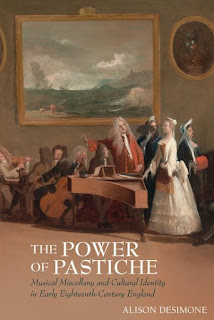
About the book, from the publisher:
In eighteenth-century England, "variety" became a prized aesthetic in musical culture. Not only was variety-of counterpoint, harmony, melody, and orchestration-expected for good composition, but it also manifested in cultural mediums such as songbook anthologies, which compiled miscellaneous songs and styles in single volumes; pasticcio operas, which were cobbled together from excerpts from other operas; and public concerts, which offered a hodgepodge assortment of different types and styles of performance. I call this trend of producing music through the collection, assemblage, and juxtaposition of various smaller pieces as musical miscellany; like a jigsaw puzzle (also invented in the eighteenth century), the urge to construct a whole out of smaller, different parts reflected a growing desire to appeal to a quickly diversifying England.--Marshal Zeringue
This book explores the phenomenon of musical miscellany in early eighteenth-century England both in performance culture and as an aesthetic. Chapters offer analyses of concert programming, early music criticism, the compilation of pasticcio operas and songbook miscellanies, and even the ways in which composers and performers shaped their freelancing careers. Musical miscellany, in its many forms, juxtaposed foreign and homegrown musical practices and styles in order to stimulate discourse surrounding English musical culture during a time of cosmopolitan transformation as the eighteenth century unfolded.